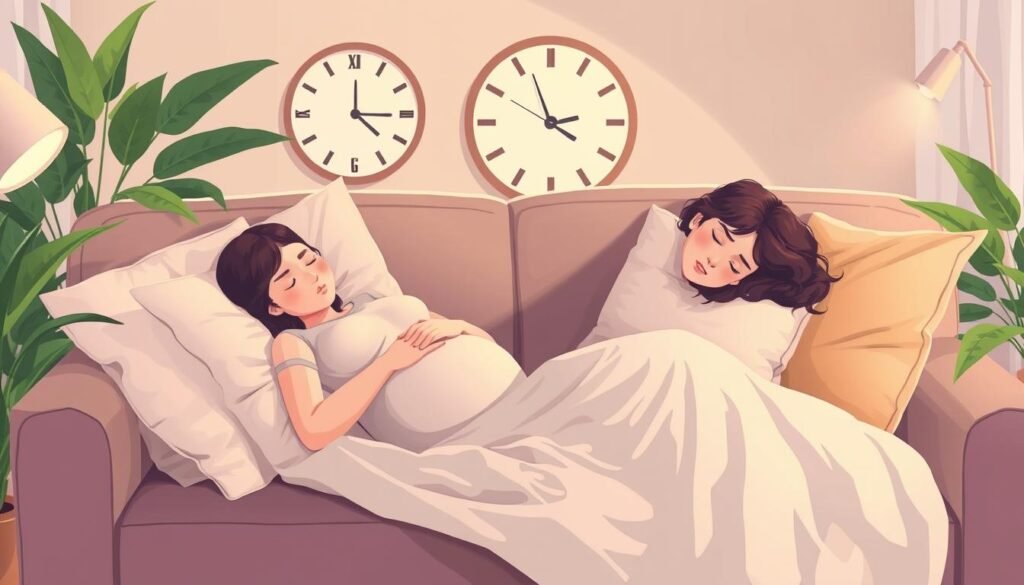Did you know that 50-90% of pregnant women feel very tired in their first trimester? This fact shows that it’s normal for expecting mothers to be exhausted. Especially early on, the body is changing a lot. So, dealing with tiredness is a big task for many. Learning why pregnancy makes you tired and finding ways to stay energized is important. It helps keep you happy and healthy during this special time.
Key Takeaways
- Fatigue is particularly prevalent in the first and third trimesters of pregnancy.
- Many women find that fatigue improves around 14 weeks into their pregnancy.
- Interruptions in sleep can significantly affect energy levels during pregnancy.
- Maintaining healthy eating habits and hydration can enhance energy.
- Medical conditions may also contribute to prolonged fatigue during pregnancy.
- Engaging in gentle exercise can help manage tiredness effectively.
- Consulting a healthcare provider is crucial for persistent fatigue issues.
Understanding Pregnancy Fatigue
Pregnancy fatigue is when women feel very tired during pregnancy. This tiredness is most common in the first and third trimesters. Many women start feeling very tired just weeks into the pregnancy. The increase in the hormone progesterone is a big reason for this fatigue. It makes the body feel sleepy. Between weeks 7 to 12, the tiredness is often at its worst. Having more blood in the body also makes you feel more tired.
In the second trimester, around week 14, many women feel more energy. This period is often called the “honeymoon phase.” But, in the last trimester, tiredness comes back. This is because of the discomfort and the extra weight of the growing baby. If you’re expecting twins or more, you might feel even more tired. This is due to the extra demands on your body and more hormones.
Chronic fatigue can be a big problem for mental health. Feeling very tired, dizzy, or having trouble concentrating are signs you should see a doctor. These could signal conditions like anemia or gestational diabetes. During the first trimester, pregnant women need about 11 to 12 hours of sleep. This is more than what other adults need.
Knowing about fatigue in pregnancy can help you deal with it better. Eating foods that are rich in nutrients, like leafy greens and lean proteins, helps keep your energy stable. Not drinking enough water can make you feel even more tired. So, it’s very important to drink plenty of water to fight off fatigue during pregnancy.
| Trimester | Fatigue Patterns | Energy Levels |
|---|---|---|
| First | Extreme tiredness peaks (weeks 7-12) | Low |
| Second | Increase in energy (honeymoon phase) | Moderate to High |
| Third | Return of fatigue due to discomfort | Low to Moderate |
Coping with Tiredness During Pregnancy
During pregnancy, it’s important to deal with tiredness to stay well. About 50-80% of pregnant people feel very tired in the first trimester. This is often because hormone levels, especially progesterone, go up a lot, making them feel drained. Besides, needing more blood and energy can make this tiredness worse. This can lead to needing almost 12 hours of sleep, instead of the usual six.
It’s key to listen to what your body is telling you during this time. You might need to rest more, finding time to relax and take it easy. Even short naps during the day can boost how energized you feel. Light exercises, like a quick 20 to 30 minute walk, can help beat some of the sleepiness. Drinking enough water is also crucial since being dehydrated can make you feel more tired.
In the third trimester, tiredness can come back because of not sleeping well and feeling uncomfortable. Paying attention to what your body needs and getting help from others can make daily tasks easier. A balanced diet is key for keeping your energy up. While no exact numbers were given, it’s important to have enough iron, especially as low iron is common later in pregnancy.

Dealing with tiredness in pregnancy means noticing when you’re tired and making changes in your routine. Doing these things can really help reduce tiredness. It makes this special time more enjoyable.
What Causes Fatigue in Pregnancy
Pregnancy fatigue comes from many sources, and it can affect women differently. A major cause is the hormone surge, especially high progesterone levels. These hormones can make women feel more tired in the early stages. Fatigue usually starts in the first week after conception and is strongest in the first 12 weeks. During this time, many women feel very tired.
As pregnancy moves forward, physical changes add to the exhaustion. Gaining weight and having to go to the bathroom often can mess with sleep. Also, leg cramps at night don’t help. In the second trimester, some women feel more energetic, but not everyone does. About 30-50% of pregnant women still feel tired, especially if they’re also taking care of other children.
In the last trimester, fatigue often comes back, with up to 70-90% of women feeling it. Carrying more weight and the bladder pressure make it hard to sleep well. Around 15-25% of expectant mothers have iron deficiency anemia, which makes the tiredness worse. Eating foods high in iron is important to help fight this tiredness.
Feeling stressed or worried can also make pregnancy fatigue worse. Things like anxiety and prenatal depression are big factors. Up to 20% of pregnant women might feel depressed, and it often shows up as fatigue. Drinking plenty of water, eating small meals to keep blood sugar stable, and doing prenatal exercises can help manage energy levels.

Symptoms of Exhaustion in Pregnancy
Many women feel very tired when they are pregnant, especially in the first and third trimesters. Feeling very tired can start as soon as one week after conception. This is often a sign of early pregnancy. About 90% of women say they are exhausted in the first trimester. Hormonal shifts, like rising progesterone levels, are mostly to blame for this pregnancy fatigue.
The body works harder to support the baby’s growth during pregnancy. It has to make and move more blood to help the fetus grow. This leads to feeling tired during pregnancy. Research indicates that 80% of women are weary in the last trimester. Understanding these signs helps in getting the right support.
- Persistent tiredness and lack of energy
- Difficulties concentrating or maintaining focus
- Increased irritability and mood swings
- Changes in sleep patterns, such as poor sleep quality or frequent awakenings
It’s crucial to know the difference between usual tiredness and signs of a bigger problem. If being tired stops you from doing everyday tasks or comes with dizziness or swelling, see a doctor. If you’re finding pregnancy fatigue hard to handle, try setting a daily routine. Include regular meals and some light exercise to lessen the tiredness. You can find detailed guidance in articles about managing fatigue during pregnancy. There’s also info on dealing with extreme tiredness before birth in this helpful piece on extreme fatigue during late pregnancy.
| Symptom | Notes |
|---|---|
| Persistent tiredness | Affects daily activities and motivation |
| Mood Swings | Emotional fluctuations can increase stress |
| Poor Sleep Quality | Common due to discomfort or anxiety |
| Difficulties Concentrating | May hinder productivity and cause frustration |
How Long Will Pregnancy Fatigue Last
Pregnancy fatigue time varies for each person, often strongest in the first trimester. Reports show fatigue in pregnancy peaks around six to eight weeks. Many women feel more energetic in the second trimester, experiencing a “honeymoon phase.”
However, fatigue often comes back in the third trimester due to discomfort and sleep issues. About 80% of pregnant women feel very tired, especially early on. Dealing with pregnancy fatigue means getting enough rest and eating well.
Doctors advise pregnant women to try for 7-9 hours of good sleep a night. They also suggest short naps during the day, lasting 20-30 minutes. Drinking enough water is key for staying hydrated.
If tiredness stays bad into the second trimester, it might be a sign of another problem, like anemia or thyroid issues. Knowing how long pregnancy fatigue lasts can help women plan and be kinder to themselves.

Tips for Managing Pregnancy Fatigue
Feeling tired when you’re pregnant is very common, especially early on and in the later stages. To fight this tiredness, it’s important to adopt healthy habits. Here are some handy tips to manage pregnancy fatigue and stay healthy.
Eat Well for Energy
Eating a balanced diet is crucial for managing pregnancy fatigue. It’s helpful to eat small, nutritious meals throughout the day to keep your energy up. Aim for foods rich in fiber, protein, and essential nutrients. Making healthy choices helps boost your energy and can ease nausea and other uncomfortable feelings.
Stay Hydrated
Being well-hydrated is important for fighting off fatigue during pregnancy. Try to drink at least 8-10 cups of fluids every day. This prevents problems like dizziness and leg cramps. Cutting down on too much caffeine is also a good idea for better energy. Drinking enough water helps tackle tiredness and keeps you healthy.
Incorporate Gentle Exercise
Light exercise, like walking or prenatal yoga, can really help increase your energy. Staying active reduces the risk of complications and boosts your overall health. It not only helps fight tiredness but also helps you sleep better, which can be tough during pregnancy. Getting moving can improve your mood and fight off feelings of fatigue.
Importance of Sleep During Pregnancy
Getting enough sleep is vital when you’re pregnant. It helps with fatigue and supports both your physical and emotional health. This care is crucial for you and your developing baby. Many pregnant women find it hard to sleep well due to discomfort, hormonal changes, and frequent bathroom visits. By understanding the importance of sleep during pregnancy, you can find better ways to cope.
Sleep Positions for Better Rest
Finding the right sleep positions can really help you sleep better. Most experts suggest sleeping on your side, particularly your left. This helps blood flow to your baby and your vital organs. Here are some helpful sleep positions:
- Left Side: Improves circulation and eases organ pressure.
- Right Side: Might also be comfy but lacks some left-side benefits.
- Fetal Position: Curling up can help with back pain.
- Using Pillows: Putting pillows between your knees or under your belly adds comfort.
Creating a Restful Sleep Environment
A sleep-friendly environment is key for better rest during pregnancy. A peaceful setting can soothe some discomfort and stress that interrupt sleep. Look at these factors for a restful environment:
| Element | Description |
|---|---|
| Lighting | Use blackout curtains to keep your bedroom dark and distraction-free. |
| Noise | White noise machines or earplugs can block out annoying noises. |
| Temperature | A cool room temperature promotes better sleep. |
| Bedding | Choose comfy, breathable bedding to support a good sleeping posture. |
With 94.2% of pregnant women experiencing fatigue, making your sleeping area better can greatly improve sleep quality. By using these strategies, future moms might overcome common sleep issues.
Fatigue in Pregnancy: When to See a Doctor
Pregnancy fatigue is quite common, but knowing when to see a doctor is key. If you’re always tired even after resting well, this might be a red flag. It’s important to talk to a doctor if you also have shortness of breath, dizziness, or paleness with your fatigue.
Severe fatigue that doesn’t get better can signal problems. Don’t wait to seek help if you also have:
- Fever of 100.4°F (38°C) or higher
- Persistent headaches described as the “worst headache of your life”
- Inability to keep down liquids for over 8 hours or food for over 24 hours
- Vaginal bleeding beyond light spotting
- Severe swelling, redness, or pain in the legs
- Changes in fetal movement, such as decreased activity
About 1 in 5 women may face depression during or after pregnancy. Watching for signs of mental health issues is crucial. If you feel very sad or anxious after childbirth, getting help is important.
Knowing the signs of exhaustion is the first step. Paying attention to your body and these warning signs is key for your health during this special time.
| Warning Sign | Recommended Action |
|---|---|
| Shortness of breath | Seek immediate medical attention |
| Persistent headaches | Contact healthcare provider |
| Fever over 100.4°F | Consult a doctor |
| Severe exhaustion | Discuss with a healthcare provider |
| Vaginal bleeding | Get immediate medical help |
Conclusion
Many expectant moms face fatigue, especially in the third trimester. Around 60% of them feel tired during this time. Knowing why fatigue happens is key, like hormonal shifts and needing more nutrients. Taking steps like eating well, drinking enough water, and light exercise helps a lot.
Getting enough sleep is crucial, a study shows. Sleeping less than 7 hours makes fatigue worse. Pregnant women should talk to doctors about sleep problems, especially later in pregnancy. Good support from a partner also makes a big difference in feeling less tired.
Managing fatigue makes pregnancy better. Talking to doctors and having a good support system is important. For more tips, check out this article. It has great advice on keeping energy up while expecting.